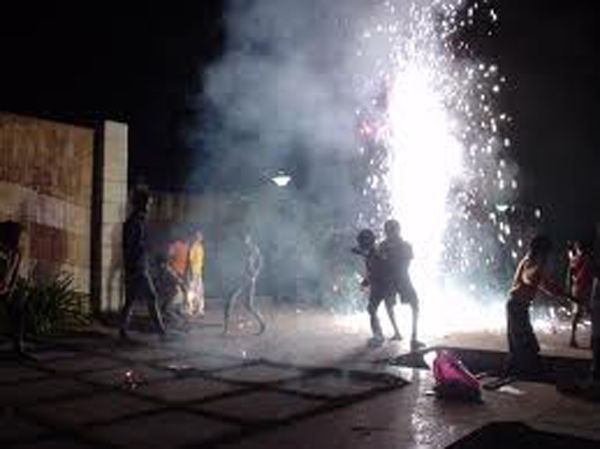Bangalore, Oct 27, 2013, DHNS: The festival of lights has become a bane for Anitha who is suffering from asthma for the past 15 years. She has spent many Deepavali days in the intensive care unit of a hospital, or has moved out of the City to avoid the smoke and fumes of firecrackers.
Due to her chronic asthma conditions, doctors have advised her to completely stay away from cracker smoke. So, every year she travels to another house in Bidadi and stays there till the festivities in the City are over.
Cold, wet weather and asthma attacks go hand in hand and what could worsen it is the poisonous smoke firecrackers emit. With Deepavali just round the corner, asthmatics and those with underlying breathing difficulties should take extra care of their health, as firecrackers produce a lot of allergens.
Dr K V Nagendra Prasad, Allergist, Bangalore Allergy Centre, says that like Anitha, he has treated many patients with asthma and has advised them to stay away from crackers.
“Cold season coupled with smoke from crackers will definitely aggravate asthma. Even the underlying symptoms can sometimes increase during the festival season. We are already receiving more patients due to the wet weather, and post Deepavali, many more patients are expected,” he added.
Getting breathless during Deepavali is mainly due to toxic gases firecrackers emit. A simple ‘bomb cracker’ emits a large amount of suspended particles – nitrogen dioxide (NO2), carbon monoxide (CO3), sulphur dioxide (SO2), phosphorous (P) and carbon particles.
Dr Pendakur Anand, chief consultant, Allergy Asthma ENT Clinic, Richmond Town, says carbon monoxide has 100 per cent more affinity to haemoglobin leading to blood poisoning. “An asthma patient already suffers from inflammatory lungs making it difficult for him/her to breathe. When such a person is exposed to a high dose of toxic gases emitted by firecrackers, it is quite natural for the symptoms to trigger,” he added.
Narrating an incident of a patient’s death due to asphyxiation, Dr Anand said, “One of my patients was in Old Delhi during Deepavali where he suffered an asthma attack due to bursting of large amounts of crackers. Though he was rushed to hospital, doctors could not attend to him on time, as they were busy attending to burn patients. Due to the delay, the patient died at the hospital.”
Burn crackers in open spaces
Crackers must be burnt outside the City in open places, and not in narrow lanes. This will ease the concentration of fumes in residential localities and firecracker accidents can also be avoided, suggests Dr Anand.
Voicing a similar opinion, Dr Nagendra Prasad wondered why the government has not come up with rules on crackers. Like in the US, where fire crackers are burnt in open spaces and tickets are sold to watch the show, similar shows should come up even in India, he said.
Dr Parashuraman, Allergy and Asthma Clinic, Kempegowda Institute of Medical Science (KIMS), says firecracker smoke acts as an ‘irritant’ just like incense sticks, perfumes, deodorants, etc. “Irritant smoke aggravates asthmatic conditions and sometimes, a patient may have to undergo nebulisation to stabilise. We normally advise parents whose children are prone to smoke allergies to avoid bursting crackers, or use masks to avoid direct inhalation of toxic gases,” he said.
Dr N Huliraj, pulmonologist, KIMS, says he normally advises parents not to buy crackers such as ‘snake crackers’, which emit more fumes. Instead, parents should choose fire crackers that emit less fumes, such as sparklers.
Many parents of asthmatic children have become cautious and started using nebulisers at home. “Every time a child develops severe asthmatic condition, parents cannot admit the child to hospital. There are a lot of constraints for parents to leave office and stay with the child in hospital. So, they have opted for nebulisers and have learnt to treat their child at home,” says Huliraj.

